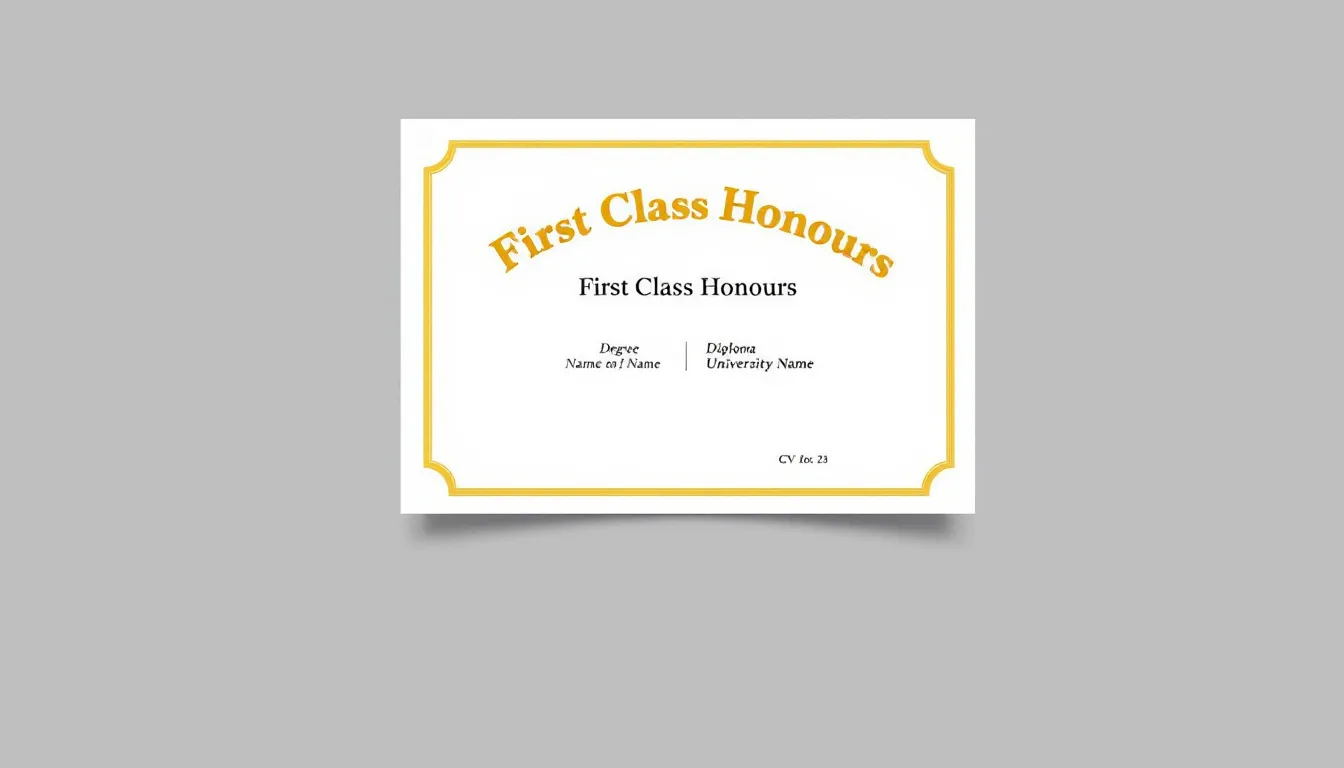How to Write First Class Honours on Your CV: Examples Included
You’ve slogged through years of uni, pulled all-nighters, and come out the other side with a shiny First Class Honours degree. That’s no small feat, and it deserves to stand out on your CV.
Why? Because it’s a badge of hard work, smarts, and dedication, qualities any employer worth their salt will notice. This blog from The CV Centre is here to show you exactly how to flaunt that academic achievement correctly, with practical tips and real examples to get it spot on. Whatever your career stage, whether you’re a fresh grad or a seasoned pro, let’s make sure your CV does it justice.
Why First Class Honours Matter on a CV
A First Class Honours degree isn’t just a piece of paper. It’s proof you’ve excelled at the top level, usually meaning a mark of 70% or above (in the UK system, at least). Employers see it and think: here’s someone who’s sharp, driven, and capable of handling tough stuff.
It’s especially handy if you’re starting out, as it can set you apart in a sea of grads who scraped a 2:1. Even later in your career, it signals a strong foundation, particularly if it ties into the job. Plus, it’s a confidence booster: you're in the top 30% of graduates with the highest academic distinction awarded. You earned it, so why not show it off?

Where to Include a First Class Honours Degree on Your CV
Placement matters. You want your first-class honours to catch the eye without overdoing it. Here’s where it fits best, depending on your situation.
In the Education Section
This is the obvious spot, and usually the best one. Tuck it under “Education” with your degree class written in full. It’s clean, straightforward, and where recruiters expect to find it. For recent grads, put this section near the top, just below your personal details. If you’ve got a few years of work experience, slide it lower, after your professional history. Either way, it’s a natural home that keeps things tidy.

In a Personal Statement (If Relevant)
If your degree ties directly to the job, weave it into your personal statement. That little intro at the top of your CV is prime real estate for grabbing attention. Mentioning your First Class Honours here can underline your suitability, but keep it brief and relevant. For example, if you’re after a research role and your honours project fits, flag it up. Otherwise, save it for the education bit.
In a Cover Letter for Added Context
Your CV lists the facts, but a cover letter lets you tell the story. Use it to give your First Class Honours some oomph, a if it’s a big selling point. Maybe you smashed a tough course or juggled it with work. A line or two can add depth, showing why it matters for the role. It’s not essential, but it’s a smart move if you want to stand out.
How to Write First Class Honours on Your CV
Right, let’s cut to the chase. Here’s how to write it up properly, step by step, so it looks sharp and does the trick for recruiters.
Step 1: Use Correct Formatting
Clarity is king. Write “First Class Honours” (or “1st Class Honours” if you prefer) after your degree title. Stick to a consistent style, like “BA (Hons) History, First Class Honours” or “BSc Physics, 1st Class Honours.” No messing about with random abbreviations or slang. Keep it formal but simple, and use the same font as the rest of your CV. Dates go next, like “2019-2022,” so it’s easy to scan. Avoid overcomplicating it with stuff like “First Class Hons” or “1st Hons”, recruiters aren’t here for a puzzle. If your uni uses a funky format, check their official wording, but the standard layout works 9 times out of 10. Job done.
Step 2: Provide Context Where Relevant
Sometimes the degree grade alone doesn’t tell the full tale. If your First Class Honours came with extras, like a standout dissertation or a tough course load, mention it. For example: “BEng Mechanical Engineering, First Class Honours, with a dissertation on renewable energy systems.” It’s not mandatory, but a bit of context can show off your focus and skills, ESPECIALLY if they match the job. Don’t chuck in every detail, nobody cares about that random seminar on medieval pottery unless it’s relevant. Pick one or two gems that tie into the role, like a project that got you a 90% or a module that’s bang-on for the gig. Less is more here so keep it tight and impactful.
Step 3: Highlight Related Achievements
Did your honours come with perks? Maybe you won an award, led a project, or aced a module. Add it in. Something like: “BA English Literature, First Class Honours, awarded Best Dissertation Prize.” It’s not bragging, it’s showing what you’re made of. Keep it short, though. One or two extras max or it’ll look like you’re padding!

Step 4: Tailor to the Job Role
Your CV isn’t set in stone. If the job cares about analysis and your stats degree got First Class Honours, play that up. Drop irrelevant details and focus on what clicks with the employer. For a creative gig, maybe skip the technical modules and highlight your thesis on storytelling. Tailoring makes your achievement resonate where it counts, not just sit there looking pretty.
Check the job ad to spot keywords like “problem-solving” or “innovation”, then tweak your honours entry to echo them. For instance, “BSc Mathematics, First Class Honours, with advanced coursework in statistical modelling” for a data role. It’s not rewriting history; it’s framing your brilliance to fit the role.

Examples of Including First Class Honours on Your CV
Let’s see it in action. Here are some real-world examples of how to present your First Class degree, depending on your situation.
Example 1: Recent Graduate Applying for a Graduate Scheme
Education
BA (Hons) Economics, First Class Honours – University of Leeds (2021-2024)
- Dissertation: “Impact of Inflation on Small Businesses” (graded 92%)
Perfect for a fresh grad. It’s up top, it’s bold, and that dissertation score is a fantastic show of competence without overcomplicating things. If you're worried about what else to include on your graduate CV, speak to us and we'll help you write it!
Example 2: Career Changer with Relevant Honours
Education
BSc (Hons) Computer Science, First Class Honours – University of Bristol (2015-2018)
- Key Modules: Software Development, Data Structures (both 1st-class standard)
Picture this: you’ve spent the last five years as a retail manager, but now you’re pivoting into tech, maybe a junior developer role. That First Class Honours from years back still carries weight since it’s in Computer Science. Highlighting those modules like Software Development and Data Structures shows you’ve got the technical chops, even if your recent jobs were in stockrooms. It’s a bridge from your past to your future. Smart, eh?
Example 3: Candidate with Multiple Degrees
Education
MSc Management, Distinction – University of Manchester (2022-2023)
BA (Hons) Psychology, First Class Honours – University of Exeter (2018-2021)
- Awarded: Psychology Department Prize for Outstanding Research
Have you got an undergraduate degree and a postgraduate one too? Stack ‘em neatly. The First Class Honours will still come to the fore, and any extra awards add a cherry on top.

Fulfill Your Potential with The CV Centre
So, you’ve bagged a First Class Honours degree, brilliant!
That’s the kind of achievement that can open a ton of doors, but only if you present it right. Don’t let a dodgy CV sell you short. Here at The CV Centre, we’ve been perfecting CVs for over 25 years, helping top-tier grads like you turn potential into results. Want expert eyes on your CV? Get a professional review from us and make sure your First Class Honours isn’t just a line: it’s a launchpad.
Contact us for a free CV review and let’s get you noticed!
FREQUENTLY ASKED QUESTIONS
How Do You Write First Class Honours On A CV?
Write it as “BA (Hons) History, First Class Honours” or “BSc Chemistry, 1st Class Honours” after your degree title. Include the university course and dates (e.g., 2019-2022). Add relevant extras like awards or projects if they match the job. Keep it clear, formal, and consistent for recruiters.
Where Should I Place First Class Honours On My CV?
You can include your First Class Honours throughout your CV as you draw upon the skills it gave you, but make sure you place it in the “Education” section. This will be near the top for recent grads, and below work experience if you're an experienced professional. For relevant roles, hint at it in your personal statement or cover letter. Ensure it’s visible but not forced, aligning with recruiter expectations.
Should I Include First Class Honours If My Degree Is Unrelated To The Job?
Yes, include it to show academic excellence. A First Class Honours proves you’re driven, even if the subject’s unrelated. Focus on transferable skills or later experience that fits the role better, keeping the degree as a strength to draw upon. Check out our blog on making the most out of your skills.
What If My Degree Classification Uses A Different System?
Convert it clearly: use “Equivalent to First Class Honours” for a high GPA (e.g., 3.7+/4.0) or list the score, like “BSc Biology, 87/100 (top 5%).” Make it simple and recruiter-friendly, avoiding confusion with non-UK systems.
Got more questions? Read our post on how to write a CV. You’ve got the goods, so let’s make sure the world knows it!

